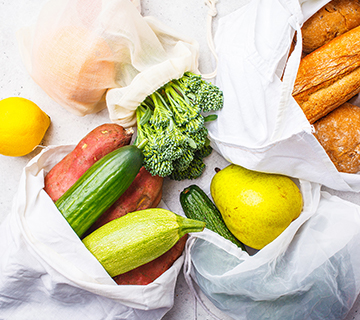Reduce Your Impact by Reducing Food Waste

Food is something we tend to take for granted. All kinds of produce and packaged foods are plentiful and available to eat almost year-round. A lot of work and resources go into getting it that way.
The FDA estimates that 80% of our nation’s fresh water, 50% of our land and 10% of our energy go toward getting food to your table. Unfortunately, not all food is eaten. Americans throw away on average 40 million tons of food, or the equivalent of $165 billion, every year.
A large portion of food waste is confusion over expiration dates. ‘Best if used by’ is the most common phrase to indicate a food’s window of quality, but it varies and isn’t a guarantee of expiration. Always check food for discoloration, strange smells or a different consistency to get an idea if it’s expired. Even better, start habits that avoid food getting close to that point in the first place. Here are some ways to do that:
- Make grocery lists and plan meals ahead of time.
- Look through your fridge and pantry before grocery shopping to avoid buying what you already have.
- Check expiration dates while grocery shopping.
- Use a refrigerator thermometer to make sure your fridge is at 40° F or below to keep foods from spoiling. Your freezer should be 0° F or below.
- Store foods in sealed containers or bags.
- Put foods that you won’t eat immediately in the freezer to prevent them from going bad.
- Check your fridge daily to see what needs to be eaten.
- Don’t leave perishable foods out at room temperature for more than two hours. If the temperature is above 90° F, perishable foods shouldn’t be left out for longer than one hour.
Taking all these steps won’t just help you reduce food waste, it’ll also help you take a look at your eating habits. Turn this into an opportunity to cut down on your environmental impact while eating healthier. Plus, you may even be able to earn rewards for it with the Online Health Coach. Eligible Standard and Basic Option members may receive $40 for completing health goals, up to three, for $120 total.



